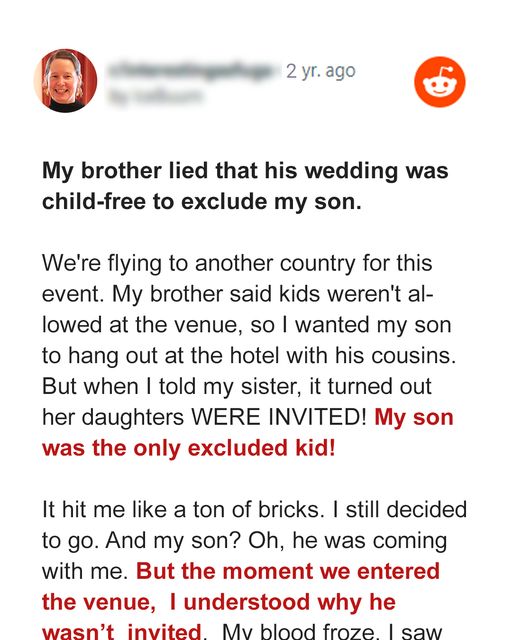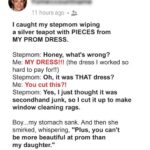A mother of three couldn’t understand why her youngest son was excluded from her brother’s child-free wedding, given that he was already a young adult. The shocking truth only emerged when the young man confronted the situation during his uncle’s special day.
This story unfolds from my perspective, a mother caught in the whirlwind of a family wedding that brought to light secrets long buried. I am a single parent to a son, Brock, who is 18 and wasn’t included in my brother’s child-free wedding day.
Besides Brock, I am also a parent to a daughter, Kimmy, 20, and a son, Jethro, 22, who were all allowed to attend the special occasion. From my knowledge and personal experience, child-free weddings usually exclude children under the age of 16, which wasn’t the case with Brock.
The confusion and hurt from this exclusion led to a confrontation that peeled back layers of family dynamics I hadn’t anticipated confronting. “I just don’t understand. Why is he the only one not invited?” I remember asking my brother, the frustration evident in my voice.
His vague apologies and explanations did little to soothe the sting of exclusion. I felt betrayed as I’d never detected any bad blood between my youngest son and his uncle. Trying to make sense of things, I called my sister, who has two children, 15 and 13, both invited to the wedding!
Since my brother refused to provide a solid answer as to why Brock was being excluded, the decision not to attend the wedding was a painful one but born from a place of solidarity with my son and a deep sense of injustice. My sister, equally outraged, stood with me, ready to forgo the event.
The family backlash was immediate, with our mother and my brother’s fiancée labeling our actions as an overreaction, further deepening the rift. “You can’t make John’s wedding about you and Brock; it’s his special day, not yours,” scolded my elderly mother.
“So you’re siding with him?” I questioned. “What should I say to my son? How do I explain this exclusion while I attend John’s wedding, pretending everything is okay?” My mother couldn’t give me a satisfactory answer but mentioned that all she wanted was peace among her children.
Speaking to my mother made me reconsider my attendance at the wedding, but my sister and I decided to ignore John’s request and bring Brock along anyway. As we approached the wedding venue, the weight of our decision to defy the exclusion and bring my son along was palpable.
Upon spotting my ex-husband (who happened to be a close friend of John’s) among the guests, the confusion and betrayal I felt was overwhelming, and it finally made sense why John didn’t want Brock attending. My confrontation with my brother was immediate, “Why? Why wouldn’t you tell me he was here?” I demanded, my voice barely above a whisper, yet carrying the weight of years of hidden pain.
John’s response was hesitant, his usual confidence replaced by a sense of guilt. “I… I was scared you’d be upset. That you wouldn’t come if you knew. I thought I was protecting you,” he admitted, his gaze dropping to the floor, unable to meet my eyes.
An ashamed and sad man sitting on a chair covering part of his face with his hand | Source: Pexels
An ashamed and sad man sitting on a chair covering part of his face with his hand | Source: Pexels
John also confessed that he was still friends with my ex-husband. The moment my son saw his father, the world seemed to stand still. I and my son’s father divorced when he was four, and to spare him from feeling abandoned, I lied and said his father had died a hero in the military. My son believed this lie all these years, and the truth sank in as he recognized the older look-a-like man.
“Dad?” he uttered, disbelief etched into every feature. His father, taken aback, could only manage a weak smile in response. “Hi, son. It’s been a long time.” Their conversation started awkwardly, each word measured, as they navigated the vast ocean of years and secrets that lay between them.
“Why didn’t you come back? Why did mom say you were…” Brock’s voice trailed off, the pain evident. “I didn’t know how to. After everything that happened, I thought it was better if I stayed away. I regret that now,” his father replied, the remorse in his voice mingling with the hope of reconciliation.
Amidst the turmoil, my sister’s support was unwavering. “We did the right thing by coming here. Brock deserved to know the truth, no matter how hard,” she whispered to me, her hand squeezing mine in a gesture of solidarity.
As the evening unfolded, the initial shock gave way to a cautious exploration of newfound relationships. My son, though visibly shaken by the revelation and the lies uncovered, showed a resilience that filled me with pride. He confided, his words offering a glimpse of hope amidst the chaos:
“I’m angry about the lies, mom. But I’m also glad I finally know the truth. I have a lot of questions for him, for you. But maybe… maybe this is a good thing.”
He believed he now had a chance to get to know his father. The drive home was a reflective one, with each of us lost in our thoughts, contemplating the revelations of the day and the uncertain path ahead. “I know I have a lot to make up for. I know you’re hurt. But I’m here now, and I want to try, if you’ll let me,” his father’s words to him echoed in my mind.
The wedding, intended as a celebration of love, became a turning point for our family. It forced us to confront painful truths, reevaluate the narratives we had clung to, and open our hearts to the possibilities of forgiveness and growth. It was a reminder that while the truth may be painful, it also holds the key to healing and moving forward, together as a family, stronger and more united in the face of adversity.


